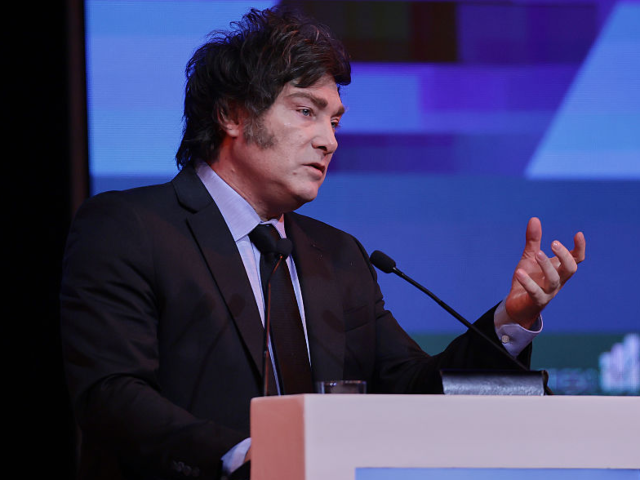President of Argentina Javier Milei on Wednesday signed a Necessity and Urgency Decree (DNU) to tighten the nation’s migratory policies and crack down on illegal migration.
The decree included a provision to ban criminals from entering the country, among other changes.
Argentina has historically maintained one of the world’s most lax immigration systems and highly encouraged European migration in the 19th century to help populate and develop the country. Article 25 of its constitution, first introduced in 1853, specifically states that the federal government “shall foster European immigration; and may not restrict, limit, or burden with any tax whatsoever, the entry into the Argentine territory of foreigners who arrive for the purpose of tilling the soil, improving industries, and introducing and teaching arts and sciences.”
The Argentine constitution grants presidents the ability to issue a Necessity and Urgency Decree (DNU), the equivalent of an executive order, when there are “exceptional circumstances” that prevent following the normal procedure for the enactment of laws, with some exceptions such as tax or electoral-related matters.
While DNUs go into effect immediately, the decrees are sent for review to chambers of the Argentine Congress, which can approve or reject it. During his first days in office, President Milei signed a DNU that modified or revoked over 350 policies implemented by past socialist administrations.
The Argentine presidency announced on Wednesday that Milei signed a DNU to carry out a profound modification of the immigration system and bring “common sense” to the nation’s migrant policies.
“Juan Bautista Alberdi [late Argentine diplomat] stated that ‘to govern is to populate’ and Argentina, since its origins, has always been a country open to the world,” the statement from the presidential office read. “However, this does not mean that taxpayers should suffer the consequences of foreigners who enter the country only to use and abuse resources that are not theirs, such as the so-called ‘sanitary tours.’ Much less, that they should tolerate that they come to commit crimes.”
“The extreme facilities that existed to date to enter Argentina caused 1,700,000 foreigners to immigrate irregularly to our territory in the last 20 years,” the Presidency continued. “This measure seeks to establish order and common sense in a system that, unfortunately, and due to the complicity of populist politicians, has been distorted.”
The DNU stated that, from now on, no convicted foreign national may enter Argentina and foreigners who commit a crime within Argentine territory will be deported regardless of the sentence. The Argentine presidency noted that offenses with sentences of less than five years, which were previously not grounds for refusal of entry or deportation, will now be taken into account.
The decree establishes that the payment of health services will be required for “transitory, temporary and irregular residents,” and it will also be mandatory to have medical insurance when entering Argentina.
“During the year 2023, medical care to foreigners in national hospitals implied an approximate expenditure of 114 billion pesos (roughly $100.7 million),” the Argentine presidency said. “This measure aims to guarantee the sustainability of the public health system, so that it ceases to be a profit center financed by our citizens.”
The reforms also authorize Argentine public universities, if they choose to do so, to establish fees for temporary residents. The Argentine presidency pointed out that free access to primary and secondary education is maintained for all residents, who may continue to have access to it in the same way as Argentine citizens as per Article 20 of the constitution.
Lastly, the DNU tightens the requirements for obtaining Argentine citizenship “as they always should have been,” and it will only be granted if a person has continuously resided in the country for two years, or has made relevant investments in Argentina. For permanent residence, proof of sufficient means of livelihood and the absence of criminal records will be required.
“Society elected President Javier G. Milei with the mandate to undertake the reconstruction of Argentina. Ensuring that taxpayers’ money is used for them and not for those who abuse our public services, that those who commit crimes do not enter or are expelled from our country, and that obtaining permanent residence or citizenship is a demanding procedure, is a fundamental step in that direction,” the Argentine presidency said.
“All those who wish to inhabit Argentine soil should know that in this country, within the law, everything; outside the law, nothing,” the statement concluded.
Argentine Presidential spokesman Manuel Adorni told reporters on Wednesday that migration to Argentina in the past was “virtuous, based on hard work and respect for the law,” and that “it contributed its part to build the great power that Argentina used to be.”
Adorni further said that “at some point the course was diverted and for some time now we have had a regulation that invites chaos and abuse by people who are far from coming in an honest way to build a future of prosperity.”
“Today, almost anyone enters, without asking many questions, and the conditions for deportation are too flexible,” Adorni said. “Criminals enter, continue committing crimes and nobody does anything. With this government that will end.”
The Presidential spokesman said that those who remain illegally in the country will not be rewarded with Argentine citizenship and stressed that “it is time to honor history and make Argentina great again.”
“Immigration reform to take care of citizens. An end to abuse, orderly immigration. Whoever violates the law, will be deported. Those who enter illegally, leave. Those who are convicted, do not enter,” Argentine Security Minister Patricia Bullrich said on social media.
“No more sanitary tours that come to be treated for free and leave. National universities will be able to charge foreigners. Law and order to make Argentina great again,” she continued.
Christian K. Caruzo is a Venezuelan writer and documents life under socialism. You can follow him on Twitter here.

COMMENTS
Please let us know if you're having issues with commenting.